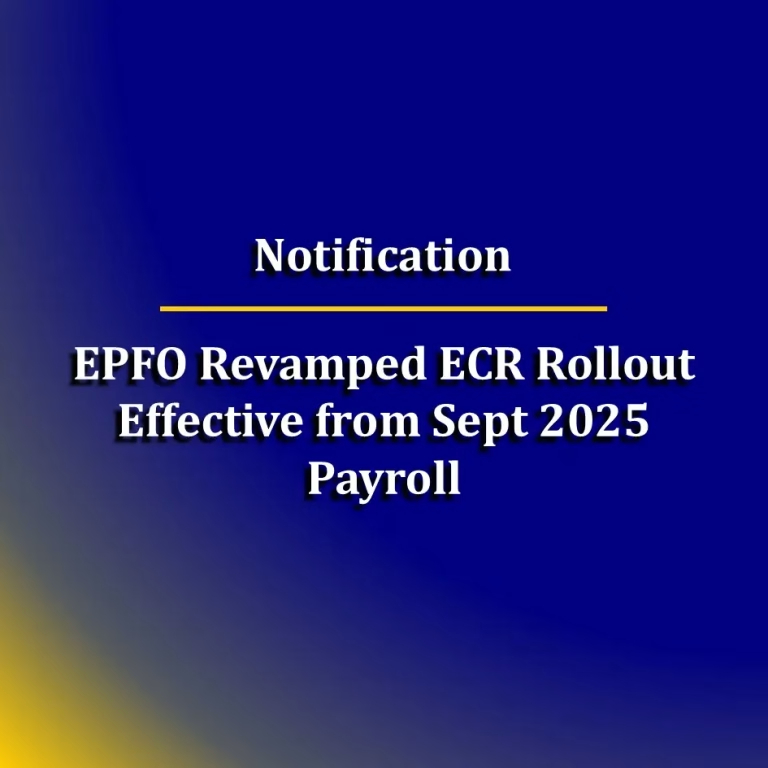Payroll taxation is a fundamental aspect of financial and legal compliance for businesses operating in India. As organizations expand and onboard employees, adherence to payroll tax regulations becomes crucial to ensure both employee welfare and compliance with government requirements. Navigating these complex regulations is essential for seamless operations and avoiding penalties. This guide provides a detailed overview of payroll taxation in India, highlighting key aspects and compliance requirements.
Understanding Payroll Taxation
Payroll taxation involves statutory deductions made from employees’ salaries by employers, coupled with employer contributions to social welfare schemes. These deductions are instrumental in funding various social security and welfare programs.
For any assistance in
HRMS, Payroll & Compliance Outsourcing, Tax Management or S&E Registration, do contact us.
We provide PAN India service.
Click here to get the Lowest QuotesComponents of Payroll Taxation
- Employee Contributions: Includes deductions such as income tax, provident fund (PF), and professional tax (PT).
- Employer Contributions: Covers contributions to statutory schemes like the Employees’ Provident Fund (EPF) and Employees’ State Insurance (ESI).
Payroll Taxes vs. Income Taxes
While income tax is a part of payroll taxation, the latter encompasses a broader spectrum, including contributions to social welfare schemes, making it distinct and more comprehensive.
Key Payroll Taxes in India
Understanding the primary payroll taxes is essential for businesses to ensure compliance:
- Employees’ Provident Fund (EPF)
- Governed by the EPF Act, 1952, this scheme ensures financial security post-retirement.
- Contributions: 12% of the employee’s basic salary from both employer and employee.
- Employees’ State Insurance (ESI)
- Regulated under the ESI Act, 1948, it provides medical benefits to employees earning up to ₹21,000 per month.
- Contributions: 4% by the employer and 1% by the employee.
- Professional Tax (PT)
- Levied by state governments, the amount varies across states, with an annual cap of ₹2,500.
- Labour Welfare Fund (LWF)
- A state-specific contribution aimed at supporting worker welfare. Rates and applicability differ by state.
Regulatory Framework for Payroll Taxes
A robust legal framework governs payroll taxation in India, ensuring effective collection and utilization:
- Income Tax Act: Regulates income tax deductions and tax deducted at source (TDS) for salaried employees.
- Labour Laws: Includes EPF Act, ESI Act, and the Payment of Gratuity Act, guiding employer and employee contributions.
- GST’s Indirect Impact: While not a payroll tax, GST affects employment costs through its application to employee benefits.
Payroll Tax Deduction Process
Accurate payroll tax deduction involves the following steps:
- Determine Gross Salary: Includes basic pay, allowances, and perks.
- Calculate Deductions: Apply EPF, ESI, and other statutory contributions.
- Implement TDS: Deduct income tax based on applicable slabs.
Employer and Employee Responsibilities
Employers play a critical role in managing payroll taxes:
- Registration: Obtain registrations for EPF, ESI, and PT.
- Record Maintenance: Keep detailed payroll records for audits and inspections.
- Timely Payments: Ensure contributions are paid within deadlines to avoid penalties.
Employees benefit from tax-saving provisions like deductions under Section 80C and exemptions for allowances such as HRA and LTA.
Challenges in Payroll Tax Compliance
Managing payroll taxation in India is challenging due to the complexity and frequent updates in regulations. Common challenges include:
- Dynamic Compliance Requirements
- Frequent changes in laws, such as revised EPF rates or updated income tax slabs, require businesses to stay vigilant.
- Multi-State Operations
- Variations in state-specific taxes like PT and LWF complicate compliance for businesses operating across multiple states.
- Calculation Errors
- Mistakes in TDS deductions or delays in EPF contributions can lead to penalties.
- Resource Limitations
- Small businesses often lack dedicated payroll teams, increasing the risk of non-compliance.
Leveraging Technology for Payroll Tax Management
Advanced technology has simplified payroll tax management, enabling businesses to ensure accuracy and efficiency:
- Automation and Software Solutions
- Modern payroll software automates tax calculations, generates payslips, and integrates updates to statutory requirements.
- Benefits of Digital Tools
- Error Reduction: Minimizes manual errors.
- Time Efficiency: Streamlines processes.
- Data Security: Safeguards sensitive employee information.
- Regulatory Updates: Ensures compliance with real-time updates.
State-Specific Variations in Payroll Taxes
India’s federal structure allows for state-specific payroll taxes, necessitating localized compliance:
- Professional Tax: States like Maharashtra and Karnataka impose progressive PT rates, while states like Delhi do not levy PT.
- Labour Welfare Fund: Contributions vary by state, with some states mandating both employer and employee participation.
Impact of Payroll Taxes on Businesses
Payroll taxes influence various aspects of business operations:
- Compliance Costs: Administrative expenses for compliance can strain SMEs.
- Hiring Decisions: High employer contributions may impact workforce expansion.
- Employee Retention: Robust benefits funded by payroll taxes enhance employee satisfaction and loyalty.
Recent Changes in Payroll Tax Regulations
Staying updated on regulatory changes is critical:
- EPF Contribution Adjustments: Temporary reductions during COVID-19 eased financial burdens.
- Expanded ESI Coverage: Increased the number of employees eligible for benefits.
- Streamlined TDS Processes: Enhanced online platforms simplify compliance.
Strategies for Effective Payroll Tax Management
- Invest in Technology: Leverage payroll software for automation and accuracy.
- Stay Informed: Regularly review government notifications and consult tax experts.
- Conduct Audits: Periodic audits identify discrepancies early.
- Train Teams: Equip HR and finance staff with up-to-date knowledge of tax laws.
Conclusion
Efficient payroll tax management is indispensable for businesses to maintain compliance, avoid penalties, and foster employee satisfaction. By leveraging technology, staying informed about legal updates, and implementing robust processes, companies can navigate the complexities of payroll taxation in India seamlessly.
For any assistance in
HRMS, Payroll & Compliance Outsourcing, Tax Management or S&E Registration, do contact us.
We provide PAN India service.
Click here to get the Lowest Quotes




